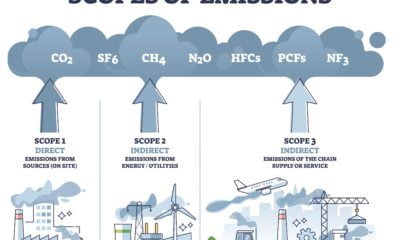

Economy
Carbon budgets can be met but policies must be strengthened, advisers warn
The UK can meet its carbon budgets, at an affordable cost, but only if the government strengthens key policies, according to the Committee on Climate Change (CCC). In a report, the committee acknowledges that progress has been made but urges the government to go further.
A progress report from the CCC found that under the current rate of progress, future carbon budgets will not be met. Current policies would see carbon emissions cut by around 23% from 2013 to 2025. However, this falls short of the required 31% if the UK is to meet its target.
Strong progress in the fuel efficiency of new cars and investment in wind generation under the renewables obligation (RO) are praised as successes.
Lord Deben, chairman of the CCC, said, “Climate change demands urgent action. We have started on the road and we are being joined by much of the rest of the world. However, despite our success, the UK is still not on track to meet our statutory commitment to cut emissions by 80%.
“The longer we leave the costlier it becomes. This report shows the best and most cost-effective ways to ensure we meet our targets. There is no time to lose.”
In order to close the gap, the CCC states that there needs to be a further strengthening of policies in a number of areas, including tackling financial and non-financial barriers around the Renewable Heat Incentive, which it described as “very generous”, addressing uncertainty around the support for low-carbon capacity beyond 2020 and supporting an ambitious EU target for new car emissions in 2030.
The committee also highlight the need for improvements in energy efficiency, both for the residential and commercial sectors. It notes that the government’s flagship green deal, which aims to encourage homeowners to install energy efficiency measures but has seen a disappointing uptake, is currently having new measure introduced. However, the organisation adds that ambition remains too low.
In the commercial sector, it notes that there is not much evidence of energy efficiency improvements, despite opportunities to do so. The report links this to a policy landscape that is complex and has mixed incentives.
In response to the report, Paul King, chief executive of the UK Green Building Council, states that it shows that the government needs to focus on energy efficiency.
He added, “[It] is ironic given that carbon reduction in buildings is not only the most effective way of tackling climate change, but it also protects both householders and businesses from soaring energy bills.
“Time is running out for the current government to grasp this and to deliver on crucial policy areas such as zero carbon homes and minimum energy performance standards in commercial buildings.”
Update: Responding to the CCC report and research from the Low Carbon Vehicle Partnership, Dr Nina Skorupska, chief executive of the Renewable Energy Association (REA), commented, “It’s great news for our energy security that the government is currently on track for its 2020 renewable electricity ambitions. Industry needs certainty to 2020 a beyond to sustain investment. 2030 renewables targets are the clearest way to achieve this.
“Government will need a significant amount of additional new capacity to power all the electric cars it is working to bring online. This new capacity must be from low carbon sources – such as biomass, solar, wind and marine renewables – if electric vehicles are to contribute to reducing the risks of dangerous climate change.
“The carbon in the power supply is only one part of the problem. Government must accelerate the roll-out of existing solutions for low carbon driving and heating, such as biodiesel and bioethanol in our fuel tanks, and biomass boilers in our homes, offices and factories. Biogas from anaerobic digestion, which prevents methane emissions from farms and landfill, also has a key role to play in decarbonising power, heating and transport.”
Photo: gc85 via Freeimages
Further reading:
Friends of the Earth analyses UK’s carbon budget
‘No legal or economic basis’ for weakening UK carbon budget
Reducing carbon budgets would be ‘incredibly short-sighted’
Green Investment Bank pledges £50m funding for energy efficiency































